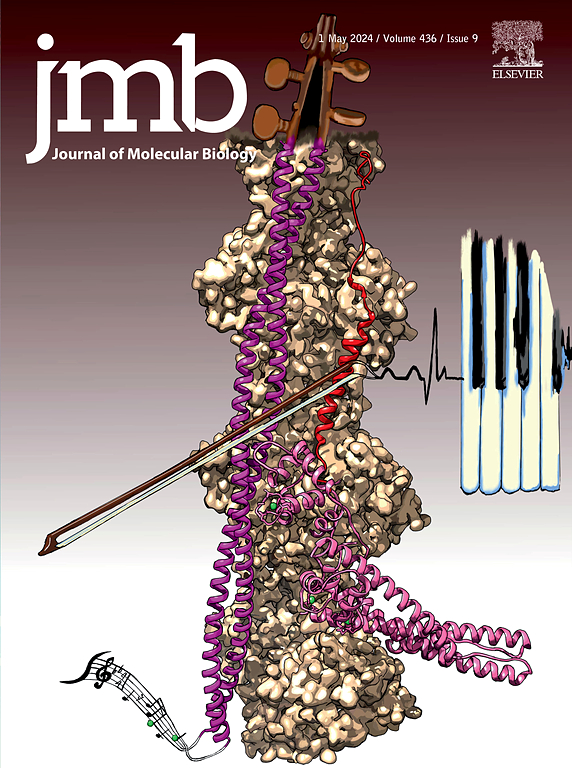Disease-associated Kv1.3 Variants are Energy Compromised with Impaired Nascent Chain Folding
IF 4.5
2区 生物学
Q1 BIOCHEMISTRY & MOLECULAR BIOLOGY
引用次数: 0
Abstract
Nascent proteins fold in a stepwise manner during all stages of biogenesis. This progression is particularly complex for ion channels composed of multiple biogenic and functional domains and subunits. The human Kv1.3 ion channel, encoded by KCNA3, is expressed in neuronal and immune cells. Its dysregulation produces chronic inflammatory disease and autoimmune disorders, which affect many in the US population, especially women. Using the unbiased ‘genome-first’ approach with integrated patient biobank databases, we identified KCNA3 gene variants associated with human disease and examined their impact on Kv1.3 channel biogenesis. Our tertiary and quaternary folding assays and all-atom molecular dynamics simulations show that KCNA3 gene variants in T1, the channel’s intersubunit recognition domain, manifest early-stage T1 folding defects, energetic instabilities, and conformational distortion of subunits concomitant with tertiary unwinding. These findings identify molecular mechanisms by which patient-associated variants influence channel assembly, potentially contributing to diverse clinical phenotypes underlying human disease.

疾病相关的Kv1.3变异与新生链折叠受损有关。
新生蛋白质在生物发生的所有阶段都以逐步的方式折叠。这一过程对于由多个生物源和功能域和亚基组成的离子通道尤其复杂。由KCNA3编码的人Kv1.3离子通道在神经元和免疫细胞中表达。它的失调会导致慢性炎症性疾病和自身免疫性疾病,影响许多美国人,尤其是女性。利用无偏见的“基因组优先”方法和整合的患者生物银行数据库,我们确定了与人类疾病相关的KCNA3基因变异,并研究了它们对Kv1.3通道生物发生的影响。我们的三级和四级折叠分析以及全原子分子动力学模拟表明,KCNA3基因在T1(通道的亚基间识别域)中的变异表现出早期T1折叠缺陷、能量不稳定以及亚基伴随三级解绕的构象畸变。这些发现确定了患者相关变异影响通道组装的分子机制,可能导致人类疾病的不同临床表型。
本文章由计算机程序翻译,如有差异,请以英文原文为准。
求助全文
约1分钟内获得全文
求助全文
来源期刊

Journal of Molecular Biology
生物-生化与分子生物学
CiteScore
11.30
自引率
1.80%
发文量
412
审稿时长
28 days
期刊介绍:
Journal of Molecular Biology (JMB) provides high quality, comprehensive and broad coverage in all areas of molecular biology. The journal publishes original scientific research papers that provide mechanistic and functional insights and report a significant advance to the field. The journal encourages the submission of multidisciplinary studies that use complementary experimental and computational approaches to address challenging biological questions.
Research areas include but are not limited to: Biomolecular interactions, signaling networks, systems biology; Cell cycle, cell growth, cell differentiation; Cell death, autophagy; Cell signaling and regulation; Chemical biology; Computational biology, in combination with experimental studies; DNA replication, repair, and recombination; Development, regenerative biology, mechanistic and functional studies of stem cells; Epigenetics, chromatin structure and function; Gene expression; Membrane processes, cell surface proteins and cell-cell interactions; Methodological advances, both experimental and theoretical, including databases; Microbiology, virology, and interactions with the host or environment; Microbiota mechanistic and functional studies; Nuclear organization; Post-translational modifications, proteomics; Processing and function of biologically important macromolecules and complexes; Molecular basis of disease; RNA processing, structure and functions of non-coding RNAs, transcription; Sorting, spatiotemporal organization, trafficking; Structural biology; Synthetic biology; Translation, protein folding, chaperones, protein degradation and quality control.
 求助内容:
求助内容: 应助结果提醒方式:
应助结果提醒方式:


